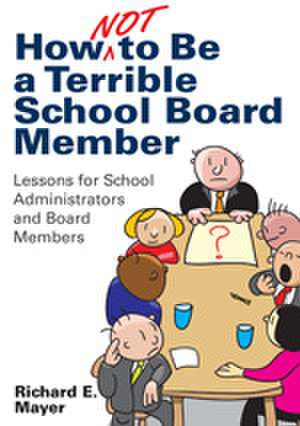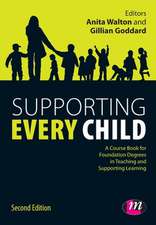How Not to Be a Terrible School Board Member: Lessons for School Administrators and Board Members
Autor Richard E. Mayeren Limba Engleză Paperback – 26 sep 2011
Preț: 238.96 lei
Nou
Puncte Express: 358
Preț estimativ în valută:
45.73€ • 49.66$ • 38.41£
45.73€ • 49.66$ • 38.41£
Carte tipărită la comandă
Livrare economică 22 aprilie-06 mai
Preluare comenzi: 021 569.72.76
Specificații
ISBN-13: 9781412997935
ISBN-10: 1412997933
Pagini: 160
Dimensiuni: 178 x 254 x 10 mm
Greutate: 0.32 kg
Ediția:1
Editura: SAGE Publications
Colecția Corwin
Locul publicării:Thousand Oaks, United States
ISBN-10: 1412997933
Pagini: 160
Dimensiuni: 178 x 254 x 10 mm
Greutate: 0.32 kg
Ediția:1
Editura: SAGE Publications
Colecția Corwin
Locul publicării:Thousand Oaks, United States
Recenzii
“The author presents powerful vignettes that successfully describe the range of behaviors, decision making, language, thinking, and actions that often consciously and unconsciously undermine the superintendent, other school officials and employees, but worst of all other board members and the important work of the board members."
“All board members volunteer to serve because they want to be effective in providing students the best education the school district can provide. Richard Mayer addresses the broad range of mistakes he has seen made by board members during his years as a board member. This is a useful resource that board members and superintendents can use to ensure the successful governance of their school districts.”
“I know of no other book that addresses this particular issue at this level of specificity and breadth. District and school administrators, as well as board members, will see it as useful.”
“I think the approach is brilliant. It’s a grabber that every insightful board member or administrator can identify with.”
“Mayer writes in an authentic and respectful manner that provides the reader with a clear understanding of what it means to be an effective board member. This is a must-read for anyone who is a current board member, aspiring to become one, or an administrator who wants to develop solid professional relationships with their board members.”
"This is the perfect book for board members and superintendents who already have busy lives but want to make sensible, reasoned choices in their work in today’s schools.”
“All board members volunteer to serve because they want to be effective in providing students the best education the school district can provide. Richard Mayer addresses the broad range of mistakes he has seen made by board members during his years as a board member. This is a useful resource that board members and superintendents can use to ensure the successful governance of their school districts.”
“I know of no other book that addresses this particular issue at this level of specificity and breadth. District and school administrators, as well as board members, will see it as useful.”
“I think the approach is brilliant. It’s a grabber that every insightful board member or administrator can identify with.”
“Mayer writes in an authentic and respectful manner that provides the reader with a clear understanding of what it means to be an effective board member. This is a must-read for anyone who is a current board member, aspiring to become one, or an administrator who wants to develop solid professional relationships with their board members.”
"This is the perfect book for board members and superintendents who already have busy lives but want to make sensible, reasoned choices in their work in today’s schools.”
Cuprins
Preface
About the Author
Acknowledgments
I. Terrible District teamwork
1. Humiliate a District Employee in Public
2. Negotiate in Public
3. Attack the Administration in Print
4. Micromanage the Superintendent
5. Never Question the Administration
6. Solicit Complaints from Teachers and Staff
7. Ask for Special Treatment
II. Terrible Board Teamwork
8. Disrespect a Fellow Board Member
9. Speak for the Board
10. Build Coalitions
11. Abstain on Tough Votes
12. Be Decisive, Don't Compromise
13. Come Unprepared to a Board Meeting
14. Do Too Much Homework
III. Terrible Public Relations
15. Represent Your Supporters
16. Minimize Public Input
17. Run Your Own District Survey
18. Argue with a Hostile Speaker
19. Confide in a Reporter
20. Garner Public Support
21. Sign a Petition
IV. Terrible Personal Style
22. Ignore Minor Conflicts of Interest
23. Take Political Stands
24. Use the District's Credit Card
25. Remember Your Political Party
26. Do a Favor
27. Accept Gifts
28. Radiate Negative Energy
Epilogue
About the Author
Acknowledgments
I. Terrible District teamwork
1. Humiliate a District Employee in Public
2. Negotiate in Public
3. Attack the Administration in Print
4. Micromanage the Superintendent
5. Never Question the Administration
6. Solicit Complaints from Teachers and Staff
7. Ask for Special Treatment
II. Terrible Board Teamwork
8. Disrespect a Fellow Board Member
9. Speak for the Board
10. Build Coalitions
11. Abstain on Tough Votes
12. Be Decisive, Don't Compromise
13. Come Unprepared to a Board Meeting
14. Do Too Much Homework
III. Terrible Public Relations
15. Represent Your Supporters
16. Minimize Public Input
17. Run Your Own District Survey
18. Argue with a Hostile Speaker
19. Confide in a Reporter
20. Garner Public Support
21. Sign a Petition
IV. Terrible Personal Style
22. Ignore Minor Conflicts of Interest
23. Take Political Stands
24. Use the District's Credit Card
25. Remember Your Political Party
26. Do a Favor
27. Accept Gifts
28. Radiate Negative Energy
Epilogue
Descriere
Build a successful board by knowing where the land mines are
Veteran school board member, Richard E. Mayer, takes a humorous approach to the serious relationship between school administrators and board members. While the overwhelming majority of school board members have good motives, even people who mean well can make bad moves. This book shows how to prevent good intentions from creating bad outcomes. Each chapter presents a negative behavior scenario and analysis, offers alternatives, and provides win-win solutions. Key features include:
Veteran school board member, Richard E. Mayer, takes a humorous approach to the serious relationship between school administrators and board members. While the overwhelming majority of school board members have good motives, even people who mean well can make bad moves. This book shows how to prevent good intentions from creating bad outcomes. Each chapter presents a negative behavior scenario and analysis, offers alternatives, and provides win-win solutions. Key features include:
- 28 brief case studies
- Lessons learned for board members
- Lessons learned for administrators












